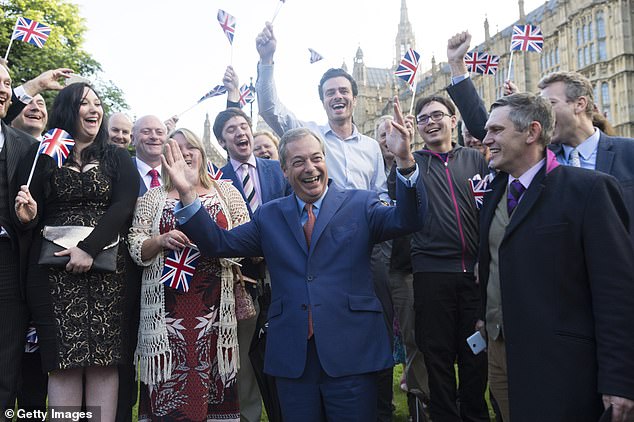[ad_1]
Payments to the European Union as part of the Brexit divorce deal have dwindled to just ‘a rounding error’, according to a leading investment bank.
The UK formally left the EU five years ago, having agreed the bill with Brussels to meet outstanding payments it signed up to when it was a member of the bloc.
Since then, the Government has paid about £25 billion to the EU, according to the latest Treasury estimates.
UK taxpayers are still on the hook for another £5.7 billion – mainly to cover contributions to EU bureaucrats’ gold-plated pensions. But these payments will be spread over decades until 2065, meaning future annual bills will be much smaller.
‘The fact we are no longer paying huge sums to the EU is a clear ‘Brexit benefit’,’ said independent economist Julian Jessop.
‘Indeed, contributions would only have grown as the EU continues to expand, adding members, taking on responsibilities and accumulating more debt.

Flying the flag: Nigel Farage celebrates with supporters after Britain voted to leave the EU in June 2016
‘The small ongoing payments to cover existing obligations – such as pension contributions – are tiny in the bigger scheme of things.’
Experts say the dwindling payments will help reduce the UK’s trade deficit – the gap between the value of imports and exports – which stood at £32 billion last year.
‘Withdrawal payments are now a rounding error,’ said Deutsche Bank’s chief UK economist Sanjay Raja. He said falling settlement payments to the bloc, which is Britain’s biggest trading partner, had ‘now almost run their course’.
The news comes as the Chancellor opens up a new line of defence by blaming Brexit and Reform UK leader Nigel Farage for the country’s woes as she lines up painful tax rises in next month’s Budget.
Rachel Reeves said last week that leaving the EU – plus austerity and the impact of the Liz Truss mini-Budget – had ‘weighed heavily on the UK economy’. In response, shadow chancellor Mel Stride said Reeves ‘should start owning up to her own mistakes and accept responsibility for the poor decisions she has made’.
These include clobbering businesses with £25 billion of higher payroll taxes in last year’s Budget, creating a ‘doom loop’ that has choked growth. Reeves has also warned that those with the ‘broadest shoulders’ should pay their ‘fair share’ of taxes in the clearest sign yet that raids on property and pensions are in her sights.
The latest forecast from the independent Office for Budget Responsibility (OBR) will land on the Chancellor’s desk tomorrow.
It is expected to show a huge black hole in the public finances as the OBR downgrades its over-optimistic forecasts for productivity – the output per worker – after years of sluggish growth. The Institute for Fiscal Studies think-tank reckons U-turns on welfare cuts, higher borrowing costs and lower tax receipts as the economy flatlines mean Reeves will have to find £22 billion to balance the books. She has pledged not to raise income tax, VAT or staff National Insurance, leaving landlords and pension savers in the firing line.
She also wants to raise her historically low £9.9 billion headroom to meet her ‘ironclad’ fiscal rule of funding day-to-day Government spending without borrowing more. The OBR is under pressure from Reeves to include ‘pro-growth’ moves such as planning reforms and the trade benefits of any EU ‘reset’ in its productivity forecast.
The watchdog estimates that Brexit will reduce long-term productivity by 4 per cent because of higher trade barriers with the EU.
But it has admitted Brexit’s full impact is not yet clear and its assumptions remain under review.
The Government has ruled out rejoining the single market or customs union but wants to let young Europeans live and work in the UK. A spokesman said of Brexit’s impact: ‘The Chancellor has said it is severe and long lasting. We are focused on moving beyond the decline of the past, with no return to austerity and our new deal with the EU being good for bills, good for our borders, and good for jobs.’
DIY INVESTING PLATFORMS

AJ Bell

AJ Bell
Easy investing and ready-made portfolios

Hargreaves Lansdown

Hargreaves Lansdown
Free fund dealing and investment ideas

interactive investor

interactive investor
Flat-fee investing from £4.99 per month

InvestEngine

InvestEngine
Account and trading fee-free ETF investing
Trading 212
Trading 212
Free share dealing and no account fee
Affiliate links: If you take out a product This is Money may earn a commission. These deals are chosen by our editorial team, as we think they are worth highlighting. This does not affect our editorial independence.
[ad_2]
This article was originally published by a www.dailymail.co.uk . Read the Original article here. .

